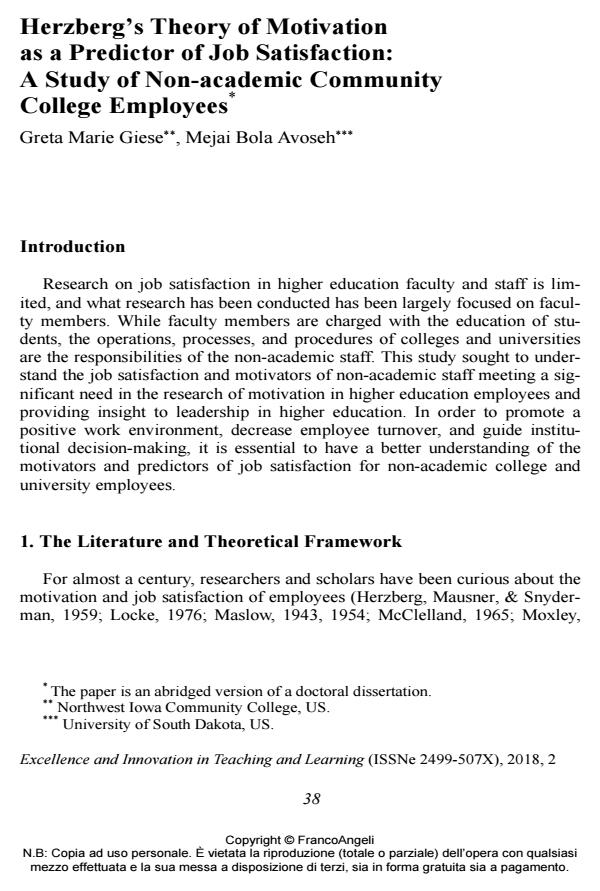Herzberg’s Theory of Motivation as a Predictor of Job Satisfaction: A Study of Non-academic Community College Employees
Titolo Rivista EXCELLENCE AND INNOVATION IN LEARNING AND TEACHING
Autori/Curatori Greta Marie Giese, Mejai Bola Avoseh
Anno di pubblicazione 2018 Fascicolo 2018/2
Lingua Inglese Numero pagine 15 P. 38-52 Dimensione file 166 KB
DOI 10.3280/EXI2018-002003
Il DOI è il codice a barre della proprietà intellettuale: per saperne di più
clicca qui
Qui sotto puoi vedere in anteprima la prima pagina di questo articolo.
Se questo articolo ti interessa, lo puoi acquistare (e scaricare in formato pdf) seguendo le facili indicazioni per acquistare il download credit. Acquista Download Credits per scaricare questo Articolo in formato PDF

FrancoAngeli è membro della Publishers International Linking Association, Inc (PILA)associazione indipendente e non profit per facilitare (attraverso i servizi tecnologici implementati da CrossRef.org) l’accesso degli studiosi ai contenuti digitali nelle pubblicazioni professionali e scientifiche
This study was designed to identify the factors that influence non-academic community college employees with a focus on the State of Iowa, United States. Non-academic employees have been mostly overlooked in the body of research on job satisfaction of higher education employees, with much of the research focusing on faculty members. Herzberg’s Theory of Motivation, which states that there are two sets of factors that influence job satisfaction, was used as the theoretical framework for this study. The study utilized multiple regression analysis to examine how multiple factors influence overall job satisfaction. Data was collected using an electronic survey instrument. The findings showed that several motivator factors were significant predictors of overall job satisfaction including achievement, responsibility, work itself, recognition, growth and development, and sense of accomplishment. The findings also showed that several hygiene factors were significant predictors of overall job satisfaction. There are significant implications of this study for community college leaders and administrators especially in the United States.
Parole chiave:Herzberg, motivation, community colleges, job satisfaction, Iowa
- Evolution of scientific ideas on professional motivation in foreign and national research Alexander P. Kaitov, in Psychological-Pedagogical Journal GAUDEAMUS /2022 pp.9
DOI: 10.20310/1810-231X-2022-21-2-9-24 - Pengaruh Faktor Kepuasan Kerja terhadap Kualitas Komunikasi Dokter-Pasien di Puskesmas Kota Cirebon Lintangkerty Suryanagari, Tri Pitara Mahanggoro, Elsye Maria Rosa, in Jurnal Manajemen Kesehatan Yayasan RS.Dr. Soetomo /2021 pp.186
DOI: 10.29241/jmk.v7i2.622 - Phenomenological Studies in Education Christa Jodon, pp.109 (ISBN:9781668482766)
Greta Marie Giese, Mejai Bola Avoseh, Herzberg’s Theory of Motivation as a Predictor of Job Satisfaction: A Study of Non-academic Community College Employees in "EXCELLENCE AND INNOVATION IN LEARNING AND TEACHING" 2/2018, pp 38-52, DOI: 10.3280/EXI2018-002003